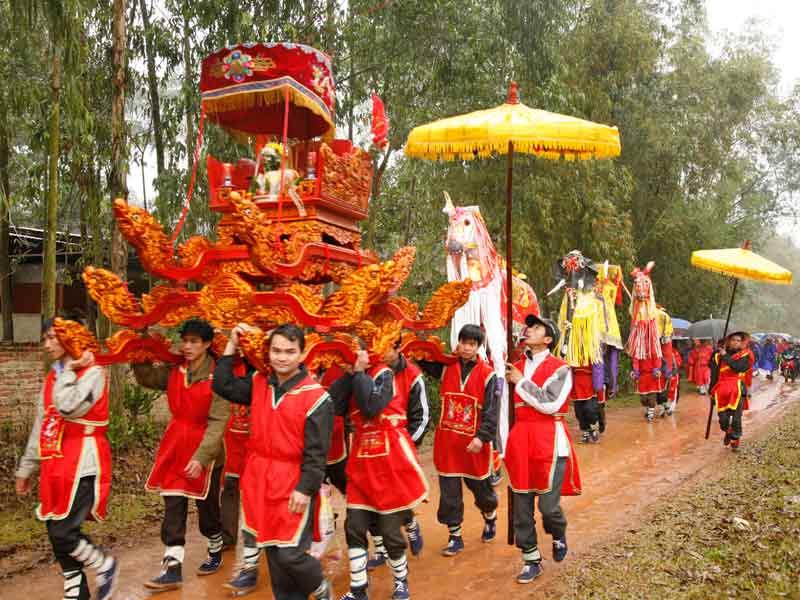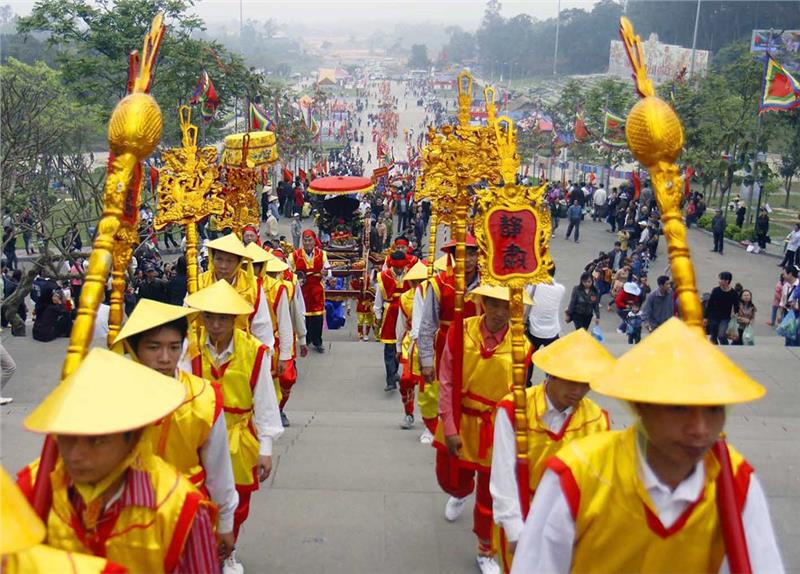The stamp collection on "Hung Kings Worship - Intangible Cultural Heritage" consists of three stamp samples and one block designed by artist Vo Luong Nhi and Vu Kim Lien. According to the long-lasting legend, Lac Long Quan and Au Co are ancestors of Vietnamese people as well as parents of the first Hung King who founded Van Lang Empire in Phong Chau, present-day Phu Tho. Van Lang, the first state of Vietnamese people, was powered by 18 Hung Kings. Hung Kings instructed people to grow rice and chose Nghia Linh Mountain to conduct rites of wet rice civilization such as worshiping rice deity and sun deity to pray for good weather and good harvest. To commemorate the great merits of Hung Kings, locals constructed Hung King Temple in the center of Nghia Linh Mountain, and chose the 10th day of the third lunar month as the anniversary of Hung Kings' death. Since then, the Hung Kings worship has been spread widely and existing for a long time countrywide. Despite of the difficulties of the countries and invasions, the Hung Kings worshiping ritual has been maintained over generations.

The historical documents showed that Hung Kings Worship had developed for a long time before the honor in Later Le Dynasty (1428 - 1788). Feudal dynasties concentrated on encouraging locals to reserve Hung Kings Worship. In Later Le Dynasty, Hung Kings' Temples in Phu Tho were ordained, along with issuing many benefits for locals and reserving the temples. So far, the Party and State of Vietnam are very interested in worshiping the Hung Kings, funding to renovate worshiping space, and bringing the legends of Hung Kings into the curriculum to educate the younger generation. Also, the government allows people throughout the country to have holidays during the anniversary of Hung Temple Festival (the 10th day of the 3rd lunar month) to participate in and organize activities towards ethnic origin. There are 1,417 Hung King temples in Vietnam.
In 2012, at the 7th session of the Intergovernmental Committee for the protection of intangible cultural heritage took place in Paris (France), The United Nations Educational, Scientific and Cultural Organization (UNESCO) formally adopted the decision to recognize Hung Kings Worship in Phu Tho as an intangible cultural heritage. Up until now, only Hung Kings Worship is recognized as a heritage in the field of belief among heritages in Vietnam. Hung Kings Worship is not a religion. It is the symbol of piety and gratitude to the merits of Hung Kings having founded Van Lang Kingdom. At present, according to the statistics of Phu Tho Tourism, Sports and Culture Department, there are 326 relics of worshiping Hung Kings and important people having great merits in the course of developing the country. The worshiping Hung King ritual is covered with high dense in all villages, but Hung Temple is the largest and oldest center of Hung Kings Worshiping Belief practice in the historical evolution of Vietnam.

With the tradition of "When drinking water, think of its source" as well as promoting the theme of Vietnam cultural heritages, Deputy Minister of Ministry of Culture and Information said that Ministry of Culture and Information will coordinate with Phu Tho People's Committee and Vietnam Post to issue a special stamp collection on Hung Kings Worship - World Intangible Cultural Heritage. The launching ceremony will take place on April 23 at Phu Tho Labor Cultural House, along with the Book Day in Phu Tho. The stamp collection on "Hung Kings Worship - Intangible Cultural Heritage" consists of three stamp samples and one block designed by artist Vo Luong Nhi and Vu Kim Lien. The stamps show images of Hung Temple entrance with cubs of Lac Hong grandchildren, the elders performing Hung Kings Worship ritual, Chung Cake and Day Cake, and communities of Vietnam ethnic groups preparing offerings to Hung Kings. The stamp block expresses the image of Upper Hung King Temple and Hung Temple entrance in Ho Chi Minh City along with delegations of people representing Vietnamese communities.
